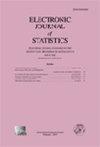评估具有层次结构的治疗的个性化治疗规则
IF 1.3
4区 数学
Q3 STATISTICS & PROBABILITY
引用次数: 0
摘要
精准医学是一个越来越重要的研究领域。由于个体特征的异质性,患者对治疗的反应可能不同。精准医学最重要的目标之一是制定直接涉及患者特征的个性化治疗规则。作为临床研究中一个有趣的话题,近年来开发了许多统计方法来寻找最佳ITR。对于二元治疗,提出了结果加权学习(OWL)来寻找患者特征的决策函数,最大化预期的临床结果。分级结构的治疗在实践中很常见。在分层场景中,如何估计ITR仍然不清楚。我们提出了一个新的框架,称为分层结果加权基于角度的学习(HOAL)来估计具有分层结构的治疗的ITRs。给出了该方法的统计性质,包括Fisher一致性和收敛速度。在线性和非线性学习下对2型糖尿病研究的模拟和应用表明,我们提出的程序在数值精度和计算效率方面都具有很强的竞争力。本文章由计算机程序翻译,如有差异,请以英文原文为准。
Estimating individualized treatment rules for treatments with hierarchical structure
Precision medicine is an increasingly important area of research. Due to the heterogeneity of individual characteristics, patients may respond differently to treatments. One of the most important goals for precision medicine is to develop individualized treatment rules (ITRs) involving patients’ characteristics directly. As an interesting topic in clinical research, many statistical methods have been developed in recent years to find optimal ITRs. For binary treatments, outcome weighted learning (OWL) was proposed to find a decision function of patient characteristics maximizing the expected clinical outcome. Treatments with hierarchical structure are commonly seen in practice. In hierarchical scenarios, how to estimate ITRs is still unclear. We propose a new framework named hierarchical outcome-weighted angle-based learning (HOAL) to estimate ITRs for treatments with hierarchical structure. Statistical properties including Fisher consistency and convergence rates of the proposed method are presented. Simulations and an application to a type 2 diabetes study under linear and nonlinear learning show the highly competitive performance of our proposed procedure in both numerical accuracy and computational efficiency.
求助全文
通过发布文献求助,成功后即可免费获取论文全文。
去求助
来源期刊

Electronic Journal of Statistics
STATISTICS & PROBABILITY-
CiteScore
1.80
自引率
9.10%
发文量
100
审稿时长
3 months
期刊介绍:
The Electronic Journal of Statistics (EJS) publishes research articles and short notes on theoretical, computational and applied statistics. The journal is open access. Articles are refereed and are held to the same standard as articles in other IMS journals. Articles become publicly available shortly after they are accepted.
 求助内容:
求助内容: 应助结果提醒方式:
应助结果提醒方式:


